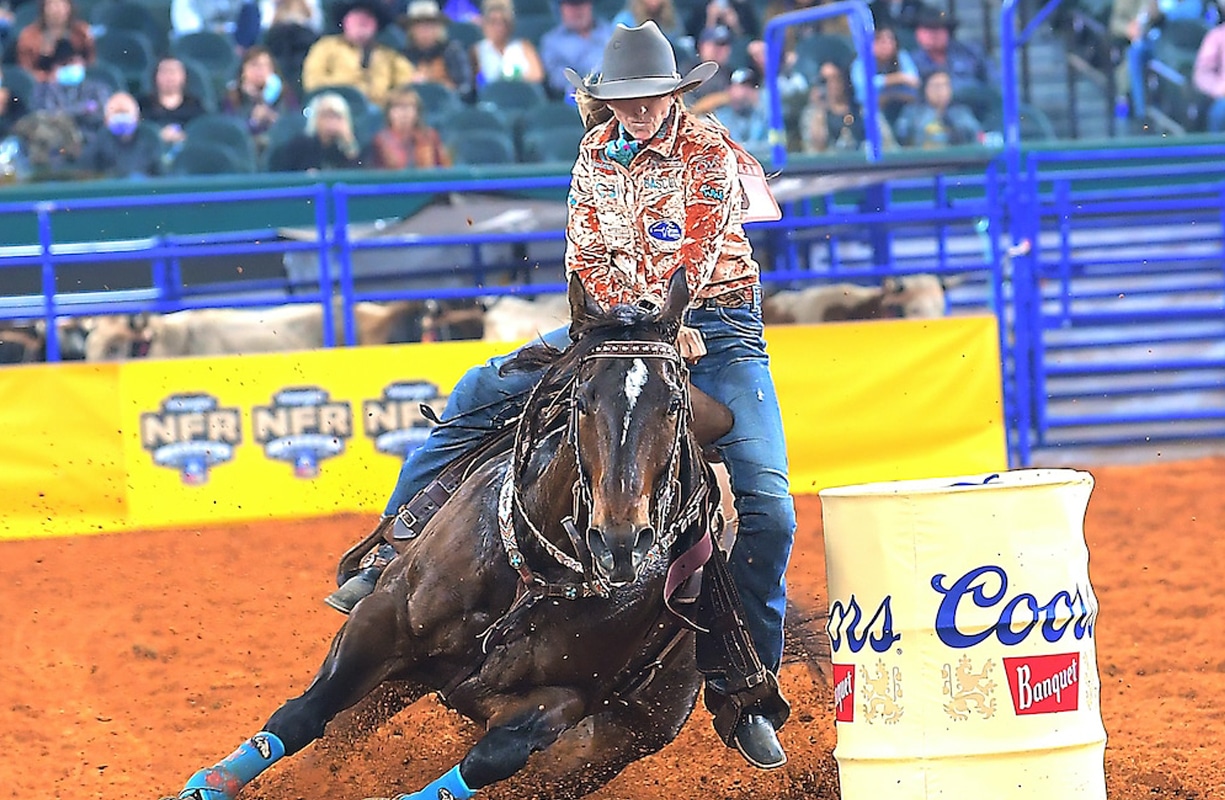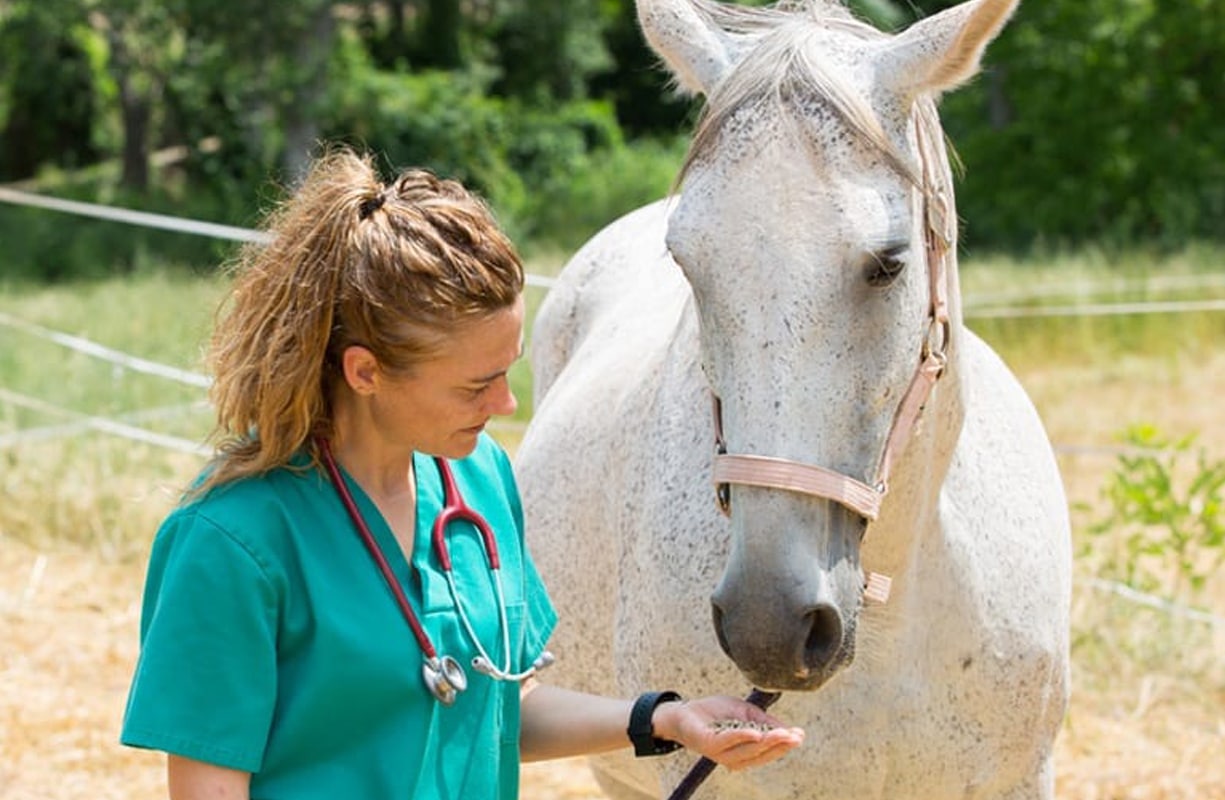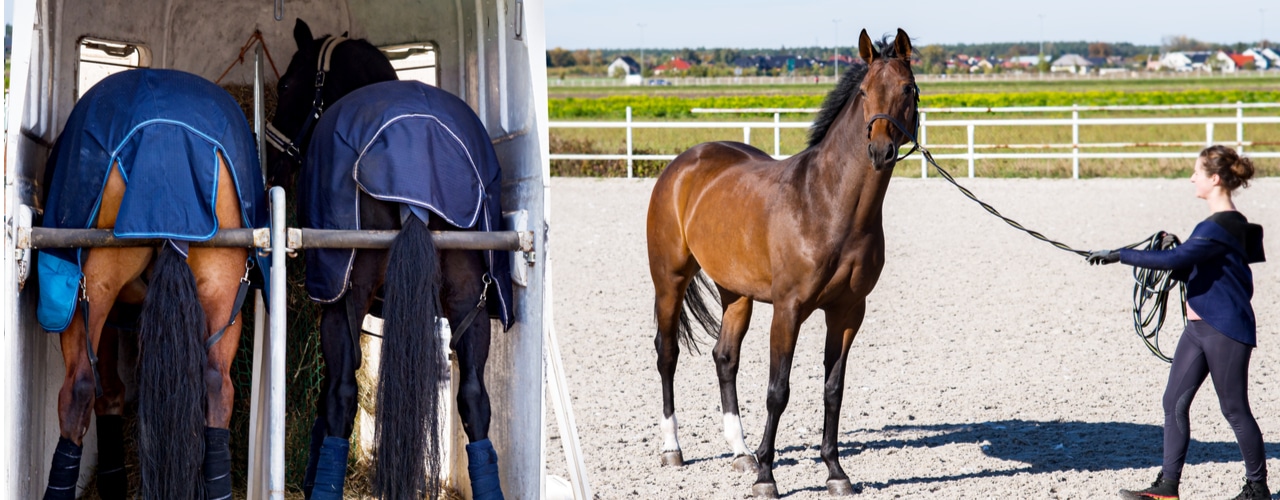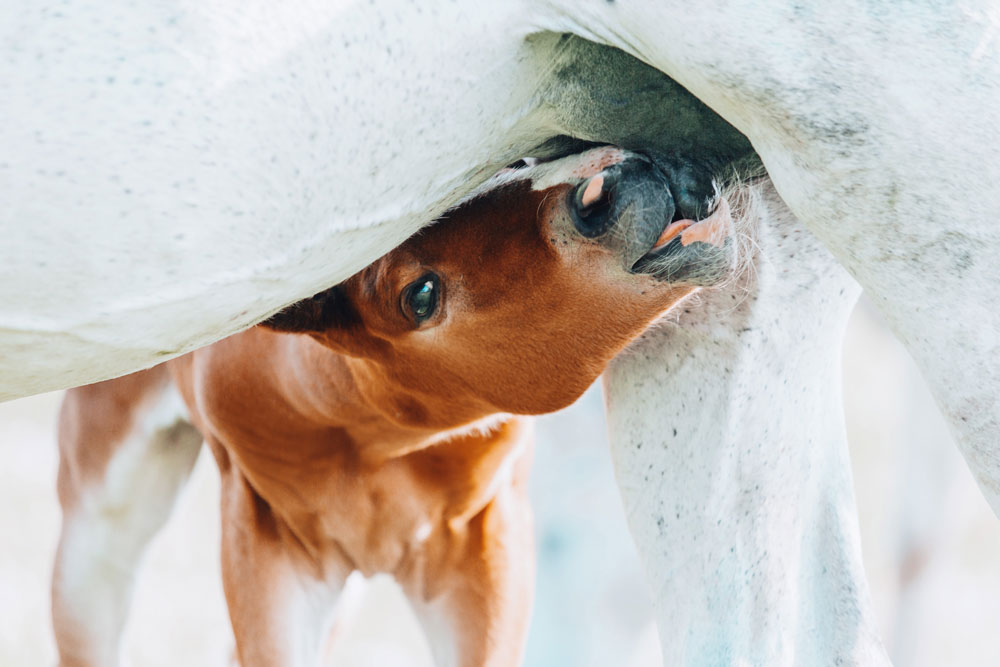Your performance horse can’t succeed in the competition arena without a strong foundation of good health and nutrition. Yet, many owners struggle to balance the demanding travel schedules of equine athletes with their horse’s mental and physical needs.
Modern feeding practices and competitive lifestyles often contribute to a vicious cycle of poor digestive health and performance problems. But understanding the relationships between management, digestive function, and behavior can help you prepare your horse to adjust to life on the road so he can reach his full potential. Keep reading to find out how.
How Travelling Affects Digestive Health
Horses are creatures of habit. When their normal routines are upended by travel and competition schedules, equine athletes often struggle with physical and mental challenges that have an adverse effect on their performance.
This disruption of your horse’s physiological equilibrium often contributes to the development of digestive issues (Luthersson et al., 2009). Traveling to a competition disrupts normal feed routines, restricts turnout, and can overwhelm the horse with external stimulation from an unfamiliar environment.
All of these factors can upset the delicate balance of the equine gastrointestinal tract and ruin a show season before the end of your very first competition. Research has demonstrated that recreational horses exposed to activities commonly associated with going to competitive events can develop digestive problems within just five days (McClure et al., 2005).
Performance Issues and GI Discomfort
Horses struggling with poor digestive health may not be able to get the energy and nutrition from their diet that they need to perform (Julliand et al., 2001). And if performance horses are suffering from pain or discomfort, they may react negatively when asked to work.
Behavioral symptoms associated with poor digestive health include girthyness, flank sensitivity, and a reluctance to flex, extend, or collect. When horses fall short of their potential due to resistance or lack of focus, many riders are quick to think of these as training problems. But even the best training in the world can’t counteract ongoing gastrointestinal challenges.
Hindgut Problems in Performance Horses
While performance horses are susceptible to gastric issues, owners should not overlook common hindgut problems that may be just as common, just as significant to the horse’s health and well-being, and more challenging to identify. Girthyness is often attributed to stomach problems, but the stomach is located far away from the girth (White et al., 2007). The colon is in a location that is far more susceptible to pressure from girthing.
Most horse owners default to addressing the foregut to manage behavioral and performance issues. But in reality, the stomach makes up only about 10 to 15% of the equine digestive tract. Ongoing studies have proven that the remaining 85 to 90% of the equine gut–the hindgut–is just as vulnerable and that nearly 60% of performance horses struggle with hindgut issues (Pellegrini, 2005).
The best way to support hindgi tract health in your performance horse is to address the root causes of problems with proactive management. Whether you are away or at home, promoting good digestive health should play a role in every decision you make.
Maintaining Routines Away From Home

While intense travel schedules can place extra demands on the equine digestive tract, there are several ways that you can help your horse settle into a routine and stay comfortable on the road.
Encourage Hydration
Horses may refuse to drink during travel, leading to dehydration. Adequate water consumption is critical for digestive health, so consider installing water buckets in a safe location in your trailer.
Horses may also dislike the taste of unfamiliar water at the show. Bringing some water from home can help them get used to the change, and feeding electrolytes or providing a mineral block at the show can encourage your horse to drink.
Offer Free Choice Hay
Free choice forage should be the foundation of every equine diet, as the equine digestive tract relies on a consistent intake of forage to function normally. Offer free-choice hay in your trailer in hay nets to keep your horse’s GI tract working while he travels.
Keeping hay in front of your horse while he is confined in a stall at the show will help replicate grazing behaviors as much as possible to promote optimal gut function. However, remember to bring enough hay from home for the entire show, as changes in forage can also upset digestive health.
Stick To Your Normal Feeding Schedule
Sticking to a consistent schedule that your horse knows from home is critical for helping him settle in at a show. Follow your horse’s regular feeding schedule as much as possible by providing the same meals at similar times to keep his digestive system working normally.
The equine digestive system is designed to digest small, frequent meals. So try to split your horse’s feed into as many meals as possible at home and at the show.
Mimic Normal Turnout With Hand Grazing and Hand Walking
Horses who are used to regular turnout may not appreciate the disruption to their routine if they are stuck in their stall for an entire horse show weekend. Keeping your horse moving and allowing him to graze can help replicate his routines from home and promote optimal digestive health.
Digestive Support For Life On The Road
Even with the best care and management, performance horses often need a little extra support for life on the road. Daily digestive support from SUCCEED Digestive Conditioning Program helps condition your horse’s gut long before the show to help him cope with the demands of traveling and competing.

Top competitors like barrel racer Cheyenne Wimberley often struggle with horses who don’t adjust well to frequent travel. After behavioral issues forced Cheyenne to leave her horse Chewy at home, her vet recommended that she try SUCCEED for hindgut support.
After noticing remarkable changes in Chewy, Cheyenne started all of her competition horses on SUCCEED. She believes SUCCEED is vital for supporting hindgi tract health at the height of competition season and recommends it to anyone who frequently travels with horses.
Identify Hindgut Issues With SUCCEED FBT

If your horse struggles with behavioral issues during travel, it might indicate an underlying hindgut problem. Talk to your vet about testing your horse with the SUCCEED Fecal Blood Test to help identify any hindgut problems before they derail your competition season.
Ready to Try SUCCEED?
Take the SUCCEED Challenge to try SUCCEED risk-free for 60-days and see the difference digestive support that addresses the entire system can make in your performance horse. See results, or it’s free!
Tried SUCCEED before? Find out where to buy SUCCEED here.
References
Julliand, V., De Fombelle, A., Drogoul, C., Jacotot, E. (2001) Feeding and microbial disorders in horses: Part 3—Effects of three hay: grain ratios on microbial profile and activities. Journal of Equine Veterinary Science, 21(11): 543-546.
Luthersson, N., Nielsen, K.H., Harris, P., Parkin, T.D. (2009) Risk factors associated with equine gastric ulceration syndrome (EGUS) in 201 horses in Denmark. Equine Vet J.
McClure, S.R., Carithers, D.S., Gross, S.J., Murray, M.J. (2005) Gastric ulcer development in horses in a simulated show or training environment. J Am Vet Med Assoc.
Pellegrini, F.L. (2005) Results of a large-scale necroscopic study of equine colonic ulcers. Journal of Equine Veterinary Science 25:113-117.
White, G.l., McClure, S.R., Sifferman, R., Holste, J.E., Fleishman, C., Murray, M.J., Cramer, L.G. (2007) Effects of short-term light to heavy exercise on gastric ulcer development in horses and efficacy of omeprazole paste in preventing gastric ulceration. J Am Vet Med Assoc. 230(11).




